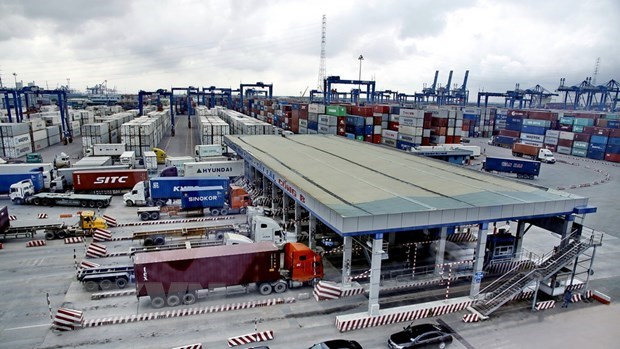 |
|
A view of a terminal of the Saigon Newport Corporation.Logistics firms are expected to benefit from the inflow of foreign capital, asthe amount of shipments handled at ports is expected to increase thanks tothe EVFTA |
However, securities firms have warned their increased share prices may not besustained as those companies face some internal challenges in meeting the EU’srequirements.
Logistics and industrial property are two economic sectors that would benefitfrom the transfer of capital from the EU to Vietnam as the free trade agreementhas opened the door for more foreign investors.
Viet Dragon Securities Co (VDSC) says Vietnam may become a new manufacturinghub as US-China trade tensions could shift global manufacturers to Vietnam fromChina.
With the signing of the EVFTA, shipments to Vietnam will increase as foreigncompanies will have to import machines and equipment to establish their plantsin the country.
However, VDSC warns Vietnam is becoming highly dependent on foreign directinvestment (FDI). Therefore, if FDI firms underperform, the logistics sectorwill also dive.
In addition, a large number of logistics companies haven’t maximised theirpotential and improved their competitiveness, so they won’t be able to make thebest use of the advantages brought by the EVFTA.
Analysts have said textile and garment companies are going to take advantage ofthe trade deals between Vietnam and the European Union as EU tariffs on theseproducts will be curbed to zero per cent by 2026.
But if Vietnamese producers want tax cuts for their exports, they have to meetthe EU’s strict requirements on the origin of input materials, according to areport by Bao Viet Securities Co (BVSC) released in June, 2019.
For textile and garment products, input materials must be locally made in Vietnam,the EU and markets with free-trade agreements with the two sides – like theRepublic of Korea – and the production must be done in Vietnam or the EU.
Few Vietnamese textile and garment firms meet those requirements as localcompanies are only capable of production, while input materials must beimported from China and Taiwan – which are not bound by any trade deals withthe EU, BVSC reports.
Concerns about the lack of producing raw materials among textile and garmentcompanies caused their shares to underperform or record modest gains on July 8.
Of the 20 textile and garment companies listed on both the Ho Chi Minh and Hanoi stock exchanges, only Duc Quan Investment and Development JSC (HoSE: FTM) gained 0.8 percent on July 8.
The rest of the companies’ stocks either slid or closed flat at the end of thefirst day of the week. Shares of Everpia JSC (HoSE: EVE) fell 0.7 percent and ThanhCong Textile Garment Investment Trading JSC (HoSE: TCM) lost 2 percent.
Since June 30, Everpia shares have slid 1.1 percent while Thanh Cong shares have gained only 2.2 percent. - VNS
 Vietnam’s benchmark VN-Index has risen since the ratification of the EU-Vietnam trade agreement on the back of listed firms whose exports would be boosted by the deal.
Vietnam’s benchmark VN-Index has risen since the ratification of the EU-Vietnam trade agreement on the back of listed firms whose exports would be boosted by the deal.